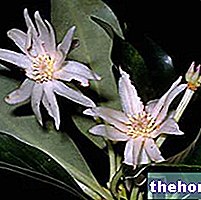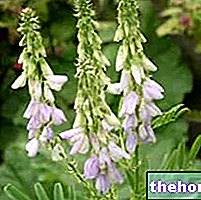
Natural laxatives, such as pharmacological ones, must not be used for too long: if the body gets used to it, it incurs a period of intestinal atony, an effect enhanced above all by irritating laxatives, which exert their action by altering the physiology intestinal.
Laxative herbal products should only be used in case of constipation and preferably when advised by your doctor.
associated with a sedentary lifestyle: in this case the most effective remedy is not represented by herbal laxatives, but by the correction of eating habits and the adoption of a more appropriate lifestyle.
Often connected to constipation we find dyspeptic problems, sometimes considered a cause, other times an effect: in this case constipation occurs because the body needs more time to finish digestion.
Water is a fundamental element, to always accompany this category of products, despite the fact that, in some way, it can already be considered a sort of natural laxative against constipation.
, derived from squeezing the seeds of prunus amigdalus. The oil obtained has a straw yellow color and, administered orally, is an excellent lubricating laxative: in fact, it does not interfere with the physiology of the intestine and improves the rhythm of the evacuations. One or two tablespoons of almond oil should be taken before meals (PLEASE NOTE: make sure you buy sweet almond oil suitable for oral use). : they are among the irritating laxatives and have side effects similar to the drugs used against constipation.
Senna, cascara, buckthorn, aloe juice, rhubarb are the drugs used: anthraquinone laxatives are the most risky because, directly interfering with the physiology of the last intestinal tract, they can cause diarrhea accompanied by substantial abdominal cramps.
To be used ONLY with medical advice.
Update: New European Regulation of 18 March 2021
On April 8, 2021, the ban on marketing foods and food supplements containing hydroxyanthracenes and their derivatives, a family of molecules contained in various plants, such as aloe, cassia, rhubarb and senna, came into force.
More in detail, the new European Regulation of March 18, 2021 - which came into force, precisely, April 8, 2021 - modifies Annex III of Regulation (EC) No. 1925/2006 of the European Parliament and of the Council to as regards the botanical species containing hydroxyanthracene derivatives.
The full text can be consulted by clicking here. However, we can summarize the main points as follows:
- The following are added to the list of substances whose use in food is prohibited (Annex III part A of the aforementioned regulation):
- Aloe-emodin and all preparations in which this substance is present;
- Emodin and all preparations in which this substance is present;
- Preparations based on leaves of Aloe species containing hydroxyanthracene derivatives;
- Dantrone and all preparations in which this substance is present.
- The following are added to the list of substances whose use in food is subject to Community surveillance (Annex III part C):
- Preparations based on the root or rhizome of Rheum palmatum L., Rheum officinale Baillon and their hybrids containing hydroxyanthracene derivatives;
- Preparations based on leaves or fruits of Cassia senna L. containing derivatives of hydroxyanthracene;
- Preparations based on bark of Rhamnus frangula L. o Rhamnus purshiana A.D. containing derivatives of hydroxyanthracene.
Magnesia also stands out in this category, which is an excellent osmotic laxative of mineral origin. In herbal medicine, then, we can find drugs rich in organic acids and sugars, such as manna and tamarind. The manna cinnamon or Sicilian represents the exudate produced by the incision of the bark of the ash tree. The name "manna" derives from its main constituent (mannitol, which constitutes 98% of the phytocomplex). Tamarind acts thanks to the organic acids contained: usually, tamarind is associated with volume laxatives that stimulate peristalsis.
Watch the video
- Watch the video on youtube
Constipation is an annoying disorder, also linked to stressful conditions; moreover, constipation can be connected to other problems that aggravate the problem, such as abdominal swelling, malaise, nervousness, dyspepsia and fatigue.
The expert will have to recommend the most suitable herbal product for the person, trying to consider other aspects as well, such as the person's real problems and intentions.
Watch the video
- Watch the video on youtube




























